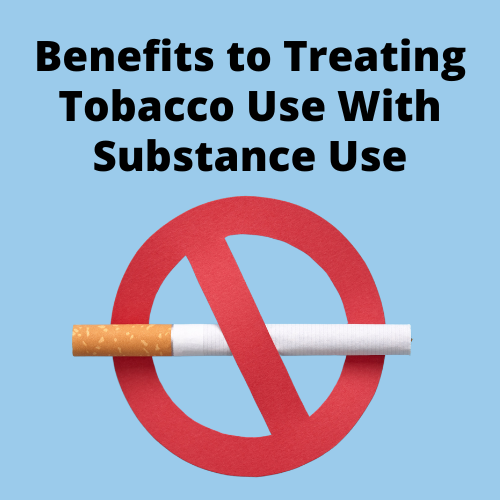
Benefits to Treating Tobacco Use With Substance Use
Why quit smoking at the same time?
It can be difficult to quit smoking or even to think about it. But tobacco use in the US has drastically fallen in the past few decades. However, tobacco use rates among those with substance use disorders remain very high. For example, over 60% of people with a substance use disorder have used tobacco in the last month, compared to 25% of people in the general public.
Whether or not you think tobacco affects your work, family life, or overall lifestyle the way that substance use disorders do; there are many other reasons to quit smoking. Smoking causes respiratory issues, like coughing and wheezing, which can also lead to lung infections. On top of that, there is an increased risk of heart disease, stroke, and many types of cancer.
Withdrawal symptoms
When you quit smoking, there are many withdrawal symptoms. Some are similar to withdrawal symptoms from other substances like depression, irritability, increased appetite, and restlessness. These physiological conditions usually last about a week. However, the psychological conditions such as anxiety, can last for years in some cases.
What are some things you can do?
Ask for help. Lifeline Connections helps many patients quit smoking. Our residential treatment for substance use has a smoke-free environment. Additionally, if you have any sort of trouble quitting a tobacco habit, we will provide whatever support you need. We offer counseling, various forms of therapy, and an exercise room. Utilizing all these resources can be very productive ways to quit. It’s also a great way to replace an unhealthy habit with a new one.
However, if you are not in need of an immersive residential treatment environment, consider these other options: You can try traditional counseling and support groups. With these options, you can not only identify your triggers and deal with negative side effects from quitting, but you can also find a community of supporters to help you along the way. Another option is 1-800-QUIT NOW. They provide resources for education and support.
Many people ask their healthcare providers about cessation medications such as the patch and lozenges. While these can be helpful, they do not necessarily replace the long-lasting effects of therapy and social support. So, it’s good to make sure you have a thorough plan, start date, and how you’ll manage cravings.
Do you or someone you know want help with a substance use disorder?
Lifeline Connections offers an integrated, holistic approach that includes therapy and case management. Our doctors specialize in the treatment of co-occurring mental health and substance use disorders. Contact us and reclaim your life.
Our compassionate team will work to design a custom plan for your treatment and wellness.
Source: HelpGuide
